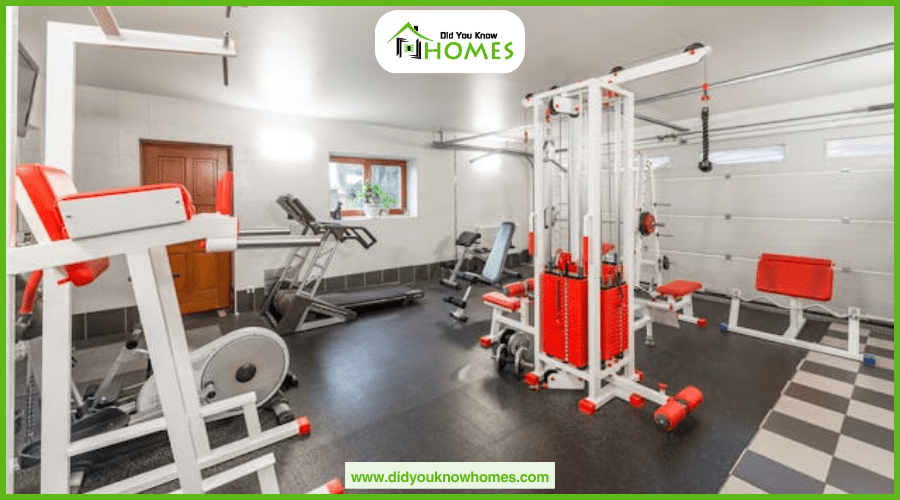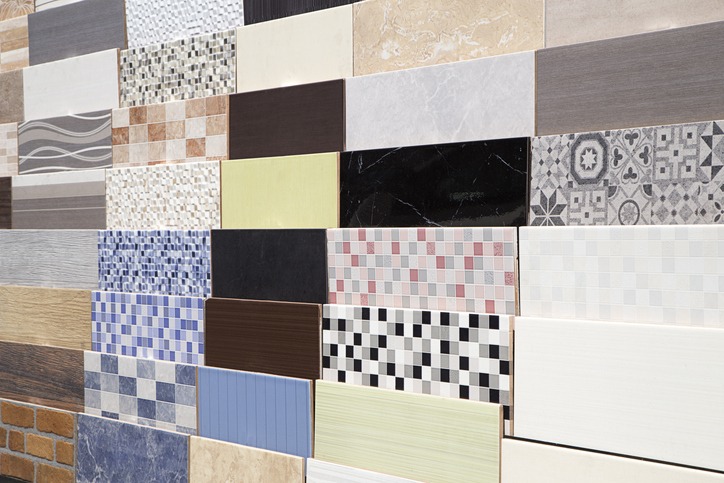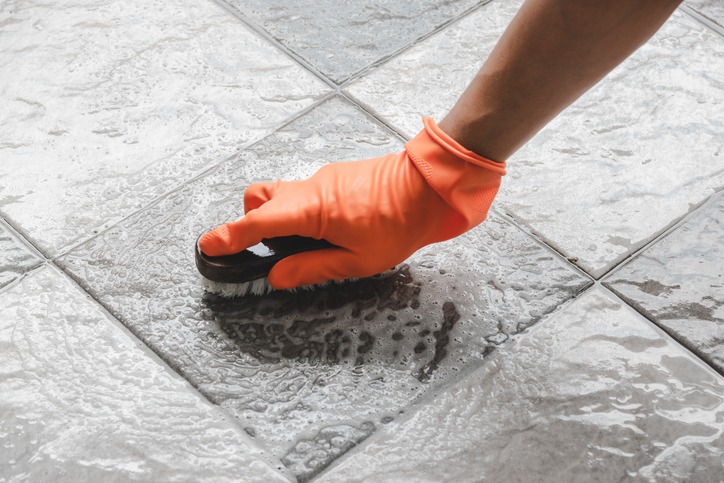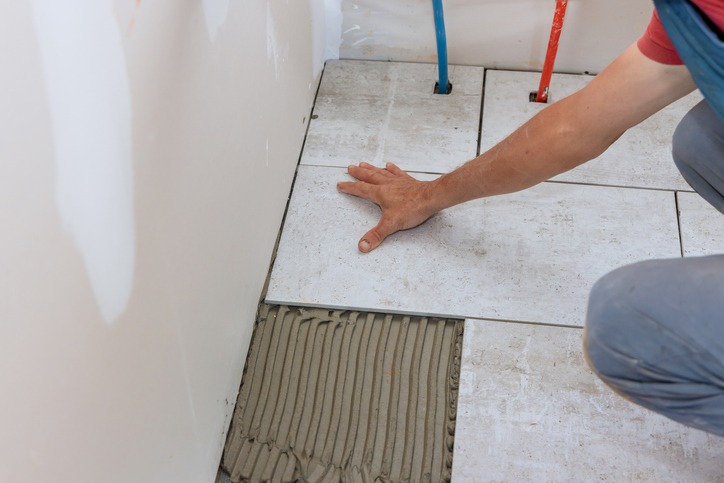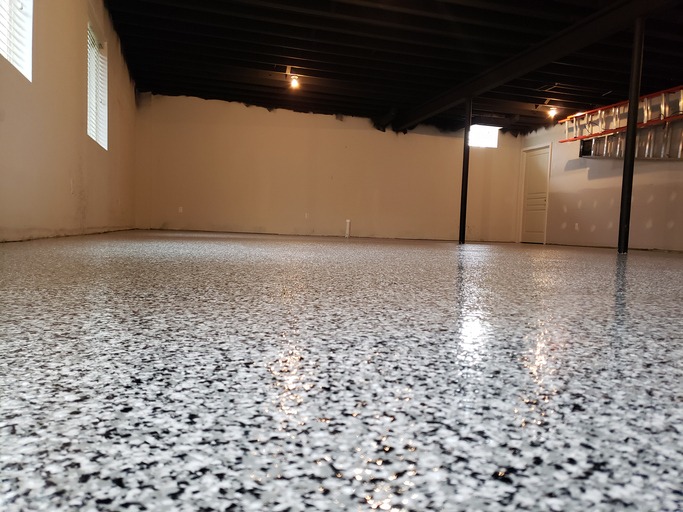For your basement and bathroom, you need waterproof flooring that’s both tough and stylish. Luxury Vinyl Tile (LVT) is a top pick – it’s 100% waterproof and can handle heavy traffic. Epoxy flooring shields against water damage and mold, while ceramic tiles offer a mix of easy maintenance and design versatility. Don’t compromise on style for the sake of functionality; sealed concrete, natural stone, and sheet vinyl also blend aesthetics with moisture resistance. With the right choice, you’ll not only safeguard your spaces from water but also elevate their look. Discover how these options can transform your home into a dry and inviting retreat.
Key Takeaways
- Luxury vinyl flooring (LVT) is 100% waterproof, making it ideal for basements and bathrooms.
- Epoxy flooring offers robust waterproofing and resistance to mold, perfect for damp areas.
- Ceramic or porcelain tiles are durable, easy to clean, and waterproof, suitable for both basements and bathrooms.
- Sheet vinyl provides a seamless and cost-effective waterproof flooring option.
- Sealed concrete is a durable, moisture-resistant choice that can be customized with colors and textures.
Waterproof Options Overview
In recent years, homeowners have increasingly turned to waterproof flooring options like luxury vinyl flooring (LVT), epoxy flooring, and ceramic tiles to protect their basements from water damage and mold growth. You’re probably looking for the best solution to keep your basement dry and mold-free. Luxury vinyl tile stands out as a top contender. It’s 100% waterproof and durable, making it an excellent choice for areas prone to spills and moisture. You won’t have to worry about it warping or swelling like traditional hardwood floors.
Ceramic tile is another smart option for your waterproof basement flooring needs. It’s easy to clean, maintain, and it offers a wide range of designs to fit your home’s aesthetic. Additionally, ceramic tile’s resistance to moisture and its longevity make it a practical choice for any basement refurbishing project.
Choosing the right basement floor tiles can seem challenging, but focusing on waterproof materials like luxury vinyl tile and ceramic tile will guarantee your basement remains dry, stylish, and free from mold. These options are not only practical but also allow you to enhance your basement’s appearance without sacrificing functionality.
Basement Flooring Solutions
Having explored waterproof options, let’s now focus on basement flooring solutions that can withstand moisture while adding value to your home. Epoxy flooring and luxury vinyl tiles (LVT) stand out as top picks for their waterproof qualities. These options not only prevent water damage but also resist mold growth, ensuring your basement remains a healthy living space.
Sealed concrete offers a robust solution, providing durability alongside moisture resistance. It’s a vital choice for those seeking minimal upkeep. Similarly, ceramic or porcelain tiles deliver resilience against water, making them ideal for basement conditions. These tiles, known for their longevity, can handle heavy foot traffic without showing wear.
Beyond durability, sheet vinyl and natural stone tiles bring an element of style to your basement. They blend functionality with aesthetics, transforming your basement into an appealing and usable space. Remember, proper waterproofing is essential. It’s not just about preventing immediate water damage; it’s about increasing your property’s value by creating a livable, inviting basement area.
Bathroom Flooring Choices
When deciding on bathroom flooring, it’s crucial to select a material that’s not only stylish but also resilient against water and easy to maintain. You want your bathroom to not only look good but to withstand the rigors of daily use without constant upkeep. Here are your top choices:
- Ceramic or Porcelain Tile: The go-to for most homeowners, tile offers unmatched durability and waterproof properties. Its ability to promote air flow helps keep the bathroom environment less humid.
- Luxury Vinyl Flooring: Don’t let the ‘luxury’ tag fool you; this waterproof flooring is as practical as it is beautiful. It’s water-resistant, easy to clean, and comes in designs that can mimic more expensive materials.
- Natural Stone Tile: For those who crave a touch of luxury, marble and other natural stone tiles provide a waterproof and long-lasting surface that adds a sophisticated flair to any bathroom.
- Epoxy and Sheet Vinyl Flooring: Both options offer a seamless and waterproof barrier against moisture. They’re incredibly easy to maintain and can handle the hustle and bustle of family life without breaking a sweat.
Choosing the right bathroom flooring means balancing aesthetics with functionality. Opt for materials that not only look great but will also stand up to water exposure and are easy to clean.
Installation Tips
Before you install your waterproof flooring, it’s essential you prep the surface correctly. Make sure you select the appropriate material that suits your space and needs. Following these steps guarantees a smooth, durable finish that’ll last for years.
Preparing the Surface
To guarantee a successful installation of waterproof flooring, it’s crucial to start with a clean, even, and dry surface. Proper surface preparation is key to preventing moisture seepage and ensuring your floor remains durable and beautiful. Follow these steps:
- Clean the Surface: Remove all dirt, debris, and moisture to create a pristine foundation.
- Level the Surface: Ensure it’s free of imperfections for a smooth base.
- Apply Primers/Sealers: Enhance adhesion and block moisture seepage with the right products.
- Let It Dry: Before laying down the flooring, make sure the surface is completely dry to avoid adhesion issues or mold.
Adhering to the manufacturer’s guidelines for surface preparation will solidify your waterproof flooring’s longevity and performance.
Choosing the Right Material
Selecting the ideal waterproof flooring material hinges on your space’s specific needs and aesthetics. Luxury vinyl flooring (LVT) is a top pick, offering 100% waterproof durability perfect for damp areas. Epoxy flooring, with its seamless finish, is a breeze to clean, making it an excellent choice for busy bathrooms and basements. If you’re leaning towards a classic look, ceramic or porcelain tile provides timeless elegance with the added benefit of being easy to maintain. For those on a budget, sheet vinyl flooring presents a practical, cost-effective solution. Alternatively, natural stone tile, like marble, elevates the luxury of your space while ensuring it stays dry. Each of these options offers waterproof assurance, making your decision a matter of matching functionality with style.
Maintenance Advice
Maintaining your waterproof flooring’s pristine condition requires prompt action and regular care. After selecting the appropriate material, which is simple to install, you’ve already taken a significant step towards safeguarding your space from water damage and enhancing air quality. However, to guarantee your flooring remains in top condition, follow this straightforward maintenance advice:
- Clean up spills immediately: To prevent water damage and uphold the flooring’s integrity, always wipe up any spills as soon as they occur.
- Regularly sweep or vacuum: This easy practice keeps the flooring free from scratches and looking new. Dust and grit can act like sandpaper, so consistent removal is essential.
- Use a damp mop for cleaning: Avoid harsh chemicals that can strip the flooring’s waterproof properties. A damp mop is adequate for keeping your floors clean and preserving their waterproof seal.
- Place mats at entrances: These serve as a barrier to dirt and moisture, safeguarding your flooring right from the doorway. Also, refrain from dragging heavy furniture across the floor to prevent damage and ensure your waterproof flooring’s longevity.
Material Benefits and Types
When selecting waterproof flooring, you’ll find a variety of materials each providing unique benefits like durability and easy maintenance. Luxury vinyl flooring (LVT) stands out as 100% waterproof, making it an ideal choice for your wet basement or bathroom. Its durability guarantees it can withstand heavy foot traffic, while its ease of maintenance makes cleaning a breeze.
Epoxy flooring, on the other hand, creates a seamless, waterproof surface that’s a breeze to keep clean. It’s particularly suited for areas that get wet often, providing a barrier against moisture with minimal hassle.
Ceramic or porcelain tile, often found in sizes like Tile 5/8 Inch x 5/8 Inch, delivers not only waterproof qualities but also durability and easy cleaning. These raised tiles, often set on a plastic base, are perfect for areas prone to moisture. Natural stone tile, such as marble, adds a touch of luxury to any space. While it shares the waterproof and durable qualities of ceramic and porcelain, it brings an unmatched aesthetic appeal.
Lastly, sheet vinyl flooring offers a cost-effective, waterproof solution for both basements and bathrooms. Its ease of installation and maintenance, coupled with its resistance to moisture, makes it a practical choice for keeping your spaces dry and stylish.
Cost and Value Considerations
When you’re considering waterproof flooring, it’s important to weigh the initial investment against the long-term benefits. By comparing costs, you’ll find that the value added to your home from durability and protection against water damage far outweighs the upfront price. Let’s explore how to make the best financial decision for your space, focusing on initial investment, long-term value, and cost comparison strategies.
Initial Investment Analysis
Considering the initial investment in waterproof flooring, you’ll find costs range from $3 to $10 per square foot, offering a balance between affordability and quality. When you delve into the initial investment analysis for waterproof flooring, it’s clear that the benefits far outweigh the upfront cost. Here’s why:
- Durability: Waterproof flooring stands up to moisture, meaning it’s a long-lasting solution for your home.
- Cost Savings: By avoiding water damage repairs, you’re saving money in the long run.
- Improved Air Quality: Less risk of mold supports a healthier living environment.
- Easy Maintenance: Simplifies cleaning, reducing time and money spent on upkeep.
Long-Term Value Benefits
Investing in waterproof flooring not only boosts your home’s value but also safeguards it against future costly damages. Opting for waterproof flooring options means you’re choosing essential damage prevention, which is vital in areas prone to moisture like basements and bathrooms. These solutions bring long-term value by reducing the risk of mold and mildew, which can save you a significant amount in potential repair costs down the line. Additionally, the easy maintenance of waterproof floors makes them a cost-effective choice, enhancing your home’s functionality and aesthetic appeal without the constant worry of upkeep. With lower utility bills and improved air quality as added bonuses, the long-term benefits of waterproof flooring are clear, making it a wise investment for any homeowner.
Cost Comparison Strategies
To make the most of your investment, it’s important to compare the costs and values of different waterproof flooring options like luxury vinyl, epoxy, ceramic or porcelain tile, sheet vinyl, and natural stone.
- Luxury Vinyl Flooring (LVT): Offers a balance between cost and durability, with products like Max Tile Raised Floor leading the pack in both style and performance.
- Epoxy Flooring: Renowned for its durability and waterproof properties, it’s a cost-effective choice for areas prone to moisture.
- Ceramic or Porcelain Tile: While upfront costs can be higher, the long-term value is unparalleled, especially when chosen for bathrooms.
- Sheet Vinyl and Natural Stone: Both provide unique benefits. Sheet vinyl is particularly cost-effective. Natural stone, while pricier, elevates aesthetics and resale value. Always review the warranty policy to guarantee maximum protection for your chosen flooring options.
Stylish Design Ideas
Immerse yourself in the world of stylish waterproof flooring by incorporating trendy patterns like herringbone or chevron to elevate your space. These designs not only add a touch of sophistication but also create a dynamic visual appeal that can transform any room. With stylish design ideas at the forefront, consider the warmth and elegance that wood-look luxury vinyl planks bring. These planks are not just about looks; they’re built to withstand water, making them perfect for areas prone to moisture.
For a modern and spacious feel, large-format tiles in a neutral color palette are your go-to. These tiles give the illusion of more space while maintaining a sleek and contemporary vibe. They’re a cornerstone of stylish waterproof flooring, combining aesthetics with functionality.
Don’t shy away from mixing different types of waterproof flooring to craft a unique and personalized style. This approach allows you to play with textures and patterns, creating a space that truly represents your taste. And for that final touch, add a pop of color with vibrant accent tiles or rugs. These elements enhance the overall design aesthetic, making your space not just waterproof, but also wonderfully stylish.
Frequently Asked Questions
What Is the Best Waterproof Flooring for a Basement?
You’re seeking the best waterproof flooring for your basement. Consider epoxy for durability and moisture resistance. Luxury vinyl offers easy installation and style options. Both are top choices, ensuring your basement stays dry and stylish.
What Type of Flooring Is Best for a Basement Bathroom?
For your basement bathroom, pick flooring that’s slip-resistant and compatible with underfloor heating. Consider luxury vinyl for its vast color options and low maintenance. It’s durable, ensuring your space stays stylish and functional.
What Is the Best Flooring to Put Over a Basement Concrete?
For your basement concrete, contemplate flooring insulation with moisture barriers and radiant heating for comfort. Incorporate decorative coatings to secure the deal. This strategy guarantees durability, warmth, and style in one intelligent solution.
What Is the Best Way to Waterproof a Basement Floor?
To waterproof your basement floor, start with moisture testing to identify any issues. Use appropriate sealant types for cracks and opt for foundation repairs if needed. Install drainage systems to manage water effectively.
Conclusion
To wrap up, you have a range of waterproof flooring options to revamp your basement or bathroom. From resilient materials to chic designs, the appropriate selection can enhance both function and style. Keep in mind, proper installation and upkeep are crucial for durability. Take into account expenses but also value—invest in quality. Whether you’re seeking practicality or aesthetics, there’s a solution that suits your requirements. Immerse yourself in your project with confidence, knowing you’re making a wise, fashionable choice for your home.
